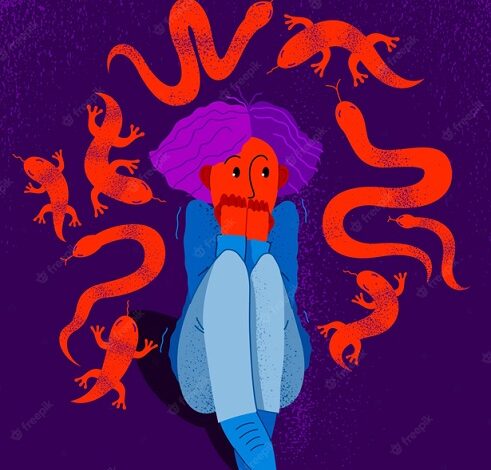Herpetophobia Causes Symptoms and treatment

If we go on vacation to some wild place, we will come across various types of animals that we are unlikely to find in the big cities of the world, some of them bigger than others. When in contact with some of these wild species, it is possible to experience some uncertainty, since, in general, we are not used to interacting with this type of animals. For this reason, it is totally understandable that a certain fear may appear in the presence of a living being whose characteristics we do not know, such as a frog or a snake. In this article we will define you Herpetophobia.
However, there are people with an intense and prolonged fear of some species of living beings in particular, a fact that can have serious consequences in their daily life. In this Psychology-Online article we will tell you about herpetophobia (reptile phobia): what it is, causes, symptoms and treatment .
What is herpetophobia
Herpetophobia is considered as an anxiety disorder characterized by an irrational fear and exacerbated by reptiles and amphibians . However, it is a clinical condition that has specific criteria that differentiate it from other types of anxiety disorders. Likewise, herpetophobia can be found within the group of specific phobias created by the DSM-V [1] .
phobia of crawling animals
In order to arrive at a correct diagnosis of herpetophobia, it is necessary to fulfill a series of specific criteria:
- Intense fear or anxiety in the face of the presence of a specific object or situation (in this case, it would be animals such as reptiles and amphibians).
- The specific object and/or situation often generates immediate fear and/or anxiety.
- The fear or anxiety is disproportionate to the actual danger the object poses and/or the specific situation.
- The duration of the clinical picture is six months or longer.
- Deterioration of professional, social and family relationships because of fear and/or anxiety.
- The changes cannot be explained by the presence of another mental disorder or by the ingestion of drugs or toxic substances.
Causes of herpetophobia
In order to devise strategies to reduce the problems of the phobia of crawling animals , it is important to know the possible origins that give rise to the symptoms. Next, we will show you which are the most important causes:
environmental factors
Unpleasant experiences with reptiles and amphibians may have markedly influenced a patient’s clinical presentation. In this sense, it is possible to develop herpetophobia if the person associates these animals with an extreme danger of death or destruction. Likewise, if a person has lived with someone who has this type of phobia, there is a high probability of imitating the same behaviors in life.
organic factors
Genetic inheritance plays a transcendental role in a person’s emotions. There are certain neuronal connections that are associated with the processing of external stimuli and that produce intense emotions. For this reason, if either parent has been diagnosed with herpetophobia, it is possible that their son or daughter will have the same condition.
In this class of anxiety disorder, the activation of cellular receptors takes place, giving rise to intense fear responses as a way of defending oneself against objects considered to be dangerous.
Symptoms of Herpetophobia
How do I know if I have a phobia of reptiles and amphibians? In order to be able to detect herpetophobia in time, it is important to know the manifestations that occur on a physical, emotional and behavioral level. Below you will find the main symptoms of herpetophobia :
- Avoid places where amphibians and/or reptiles may be present.
- Inability to talk about reptiles and/or amphibians.
- Catastrophic thoughts regarding these animals.
- Intense anxiety .
- Sweating.
- Palpitations.
- Rough breath.
- Nausea.
- vomiting.
- Dizziness.
It should be noted that the presence of any of these symptoms in isolation does not necessarily represent a condition of herpetophobia. It is essential that the diagnosis is made by a mental health professional who assesses the specific characteristics of each patient, such as age, pre-existing diseases or family history, among others.
Herpetophobia treatment
Although the phobia of crawling animals generates serious consequences for those who suffer from it, nowadays there are approaches with considerable effectiveness and efficiency to treat and improve the patient’s quality of life. Below, we explain the most effective options for treating herpetophobia:
psychological therapy
Psychotherapeutic sessions are a space in which to reflect on personal aspects that interfere in the development of daily activities. On the one hand, short-term therapies work with the emotions, thoughts and behaviors that give rise to the symptoms of the person suffering from this disorder, with the aim of offering tools to overcome the fear of snakes or other reptiles and amphibians.
On the other hand, long-term therapies try to find the origin of the symptoms by recalling childhood situations that may have initiated the phobia. While both approaches differ in duration, both have favorable outcomes for patients.
psychiatric medication
In cases of considerable severity, the administration of anxiolytic drugs will lessen the intensity of the symptoms of herpetophobia. However, it is necessary that treatment through the administration of psychiatric medication is always carried out under the supervision of a mental health professional.